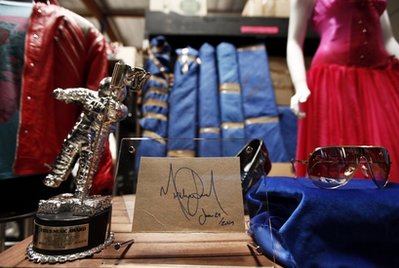Auction-goers vie for a piece of Hollywood history

Marilyn Monroe's chest X-rays. Barbra Streisand's houndstooth cap from the film "What's Up, Doc?" Elvis Presley's empty prescription bottles. Alfred Hitchcock's driver's license.
Who wants all this stuff? And why would they pay thousands of dollars for it?
Hollywood memorabilia auctions have become big business around the globe, with a seemingly endless supply of celebrity relics — and celebrity collectors who will pay big bucks for them. In what's become almost routine around town, hundreds more items will be up for sale this weekend, when props and costumes from TV's "Lost" hit the auction block.
"This market is fun because it's probably the most accessible market that's sold at auction today," said appraiser Laura Woolley, president of The Collector's Lab. "You don't need to have a huge history of connoisseurship to get the visceral reaction to the ruby slippers, and you don't need to be told why they're important. These pieces just have an instant connection with people."
For collector David Davis, it all started with Streisand's houndstooth cap.
Davis heard on the "Today" show that the wool cap she wore in 1972's "What's Up, Doc?" was going up for auction a few years ago, and on a whim, he called and placed a bid.
"I thought I could never possibly afford or win something that Barbra Streisand wore in a movie," he said. "I thought it was out of my league."
But his bid won the cap. Five years later, his collection includes several Streisand costumes, along with those worn by Cher, Carol Burnett and Paul McCartney. Davis displays the iconic outfits around his home on mannequins custom-made to look like the stars.
While Davis says his collection obsession "is bordering on insanity," the 58-year-old is at the heart of a booming business.
"What keeps this industry alive are the fans who love this stuff," said Darren Julien of Julien's Auctions, which specializes in celebrity memorabilia (and famously sold Michael Jackson's bejeweled glove for $420,000 to a buyer from Hong Kong last year).
"Planet Hollywood and Hard Rock Cafe popularized the idea of what memorabilia was," explains Joseph Maddalena, president and owner of Profiles in History, which will administer the "Lost" auction in Santa Monica. "It's the same exact thing as what you'd do with a Van Gogh: You buy it, hang it on the wall and look at it. It's pride of ownership, the bragging rights and the fact that you want to own them."
"There's something about having it in your house, in your possession," said Davis, who's spent $300,000 on his collection . "You feel a connection to the celebrity."
Other collectors see themselves as custodians of history. Scott Fortner has been collecting Marilyn Monroe books and photos since he was a kid. One of those books was an auction catalog, and it inspired him to place bids and start buying Monroe's costumes, clothing and keepsakes.
Fortner doesn't display the items at home because they're fragile and sensitive to light. But he has lent his vast collection to museums, including an exhibition at the Hollywood Museum that closes Aug. 31.
"I feel more like a curator, a holder of Marilyn's goods, rather than buying them to be close to her," he said.
But he's not immune to the intoxicating charm of her celebrity: "It's pretty amazing to be able to hold a garment or article of clothing that still has Marilyn's perfume on it and you can smell what she smelled like."
None of the collectors interviewed for this story saw their purchases as financial investments. Though Julien tells a story of a Michael Jackson fan who bought one of the pop star's jackets for $4,000 in 1989 and sold it this year for $271,000, auction experts agree that collecting celebrity memorabilia is more for the fun than for the money.
"You can't look at any of this stuff as an investment," said Kathleen Guzman, a longtime auctioneer and appraiser who works for "Antiques Roadshow." "These are sentimental purchases that may or may not retain their value in the long term."
Greg Schreiner, who has amassed a collection of more than 350 Hollywood costumes since moving to Los Angeles in 1979, said he couldn't imagine parting with a single one.
"They're like my children," he said. "I love them all."
Some collectors eventually sell their prized pieces. The ruby slippers from "Wizard of Oz" have been sold several times (most recently for over $600,000). A few Marilyn Monroe items sold at a Christie's estate sale in 1999 are back on the market.
A bad economy could inspire some to sell, Woolley said. Generational changes, too, affect what's valuable and what's popular.
It used to be that collectors sought only old Hollywood memorabilia, she said, but now modern day props and costumes can generate just as much interest. More recent celebrity memorabilia is often more affordable, too.
Because nostalgia drives the celebrity memorabilia market, emotion could overtake reason for some shoppers, inviting fraud, Woolley said. Collectors who aren't scrupulous with their research could, for example, think the reissued "Gone With the Wind" poster they just bought is actually an original from the 1939 film.
Fortner, the Monroe collector, said he always does extensive research on any item he's considering buying. Generally, though, it's up to the auction house to verify authenticity, said auctioneer Guzman, and it may provide documentation or photos to prove an item's provenance.
Where art auctions might be intimidating, memorabilia auctions are marked by a colorful energy, Guzman said, perhaps inspired by all that celebrity love.
"I'm sure people who buy contemporary paintings are passionate, but they just don't seem to be as dramatic," she said. "It's about a psychic connection... I think people identify with these stars and feel that owning something of them is like a magic talisman toward sharing their lives."
 0
0 







Go to Forum >>0 Comments